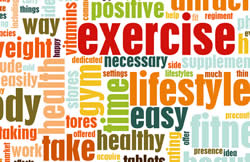Lifestyle Fitness Coaching For Optimum Health
 Introduction To Lifestyle Fitness Coaching
Introduction To Lifestyle Fitness Coaching
Over 26% of Americans are obese, with a weight to height ratio (or body mass index) of over 30, according to the Centers for Disease Control and Prevention. Over the past ten years, waistlines have expanded in every state. In 1998 most states had a relatively trim population, with less than a fifth of adult’s obese (Centers for Disease Control and Prevention, 2009).
As indicated a new report from the Trust for America’s Health and the Robert Wood Johnson Foundation, now at least a quarter of adults in 32 states are obese. And obesity rates among adults rose in 23 states over the past year, and not a single state experienced a significant decline.
It’s a national crisis that “calls for a national strategy to combat obesity,” and “the crest of the wave of obesity is still to crash” said Vice President Dr. James Marks of the Robert Wood Johnson Foundation.
In addition, two teams, one led by Pierre-Carl Michaud of the Rand Corporation in Santa Monica, California, the other by Samuel Preston of the University of Pennsylvania in Philadelphia, have dug into international health statistics to ask why US citizens can expect to die earlier than their counterparts in the richest European nations.
Michaud concludes that the blame lies largely with high rates of chronic disease caused by poor diet, lack of exercise and the lingering effects of tobacco use from a time when smoking was more prevalent in the US than in Europe.
In spite of these horrific statics there is still a very low level of physical activity participation in North America. Worst yet, health fitness professionals seem to be at loss to explain why this powerful information fails to influence close to 80% of the population (Centers for Disease Control and Prevention, 2009).
What is Lifestyle Fitness Coaching?
 Lifestyle fitness coaching is an emerging field in the fitness and coaching industry. It is centered on an ongoing and guided process of dialogue that offers a systematic approach to help fitness and coaching professional understand their client’s needs, interests, and personal orientations and use the information to direct their clients towards achieving their health and personal goals.
Lifestyle fitness coaching is an emerging field in the fitness and coaching industry. It is centered on an ongoing and guided process of dialogue that offers a systematic approach to help fitness and coaching professional understand their client’s needs, interests, and personal orientations and use the information to direct their clients towards achieving their health and personal goals.
Life coaching has been well defined and not required to define it further here. Life coaching and fitness coaching can be “combined” into a dual process of “lifestyle fitness coaching.
Lifestyle fitness coaching can be defined (Lifestyle Fitness Coaching, James Gavin,
2005) as:
- An ongoing and guided process of dialogue between a client and the health fitness professional that is.
- Informed by comprehensive fitness related data about client’s needs, interests and personal orientations, and
- Directed toward broad-based goals of personal and health gains that are new line attained through sustained involvement in physical activities, which are adjusted periodically according to the clients of evolving life agendas.
Lifestyle fitness coaching is an emerging field in the health and fitness industry. Centered on an ongoing and guided process of dialogue, lifestyle fitness coaching offers a systematic approach to help fitness professionals understand their clients’ needs, interests, and personal orientations and use the information to direct clients towards achieving their health and personal goals.
The Case for Lifestyle Fitness Coaching
Numerous studies published in the past 25 years have created an information base about those who exercise regularly and those who don’t (Dishman, 1998; Katzmarzyk, Glendhill & Shepard, 2002; Martin Ginis et al., 2003;; O’Brien Cousins, 200). In simplified terms the results of these studies of activities and in active populations just the following:
- One size fits all fitness approach is ineffective
- Biomechanical criteria are necessary but not sufficient for good programming
- Life stages and phases must be accounted for
- Not all fitness fads are created equal
- A carrot works better than a stick
- Social support is crucial for initiating and maintaining exercise commitment
- Ultimately, a holistic approach to fitness is required, motivating the body alone is not enough
Lifestyle fitness coaching relies on a dialogue to discover what a person hopes to achieve, what he or she is willing to invest, to which activity is that person most likely to commit to. In addition, what creativity can be applied to generating nontraditional exercise outcomes that may be part of the person’s fitness “wish list.”
Lifestyle fitness coaching is also a process of periodic discussions with the client about how the program is working for them, what benefits they are experiencing, what downsides they are encountering.
Also, what personal and physical needs are emerging in their lives that stem from these physical activities? Through this dialogue, coaches can help clients reflect on and continuously plan for current or anticipated changes in life patterns, interests, and capabilities.
A number of observations can be made in relating to health fitness professionals and the agendas of their actual and intending clients:
- Because they become physically close with clients, fitness instructors and personal trainers have been challenged to remain within the boundaries of their fitness agendas; they are repeatedly presented with other dimensions of their clients’ lives that affect their clients’ health and happiness. Furthermore if bodies reflect lifestyles at mental states, then it would be difficult for fitness professionals not to notice, or not to care.
- If we consider the premise that how you do anything relates to how you do everything (Festinger, 1957; Hoelter, 1985; Willensky, 1960), fitness professionals have extensive information about their clients from observing what they do and how they do it at the gym.
- If we except the possibilities that a segmented, mechanic and mechanic treatment of human beings misses the larger picture, then the practice of doing muscle test, body composition measurements, and video to max assessments without determining who people are, what they like, what they need, and what their life visions are seen not only unwise but also ineffective.
With the advent of personal training, custom-tailored programs are developed and coupled with technical support. Yet even this solution lacked essential elements addressing the fact that human beings are purposive, goal seeking creatures. They come to health and fitness centers with a wide range of needs and interests. They arrive with their whole selves.
As health fitness professionals gain greater competency in uncovering of the needs, backgrounds or goals their clients’ through formal coach training, or start working alongside a qualified lifestyle fitness coach, they will be better suited to guide and support their clients in achieving imagined and unimagined results.
‘Modern-day’ fitness is just that-a recent arrival on the landscape of life. Health fitness professionals can be described as discoverers and explorers, deconstructing myths, mapping new terrain, in creating unforeseen possibilities for participation and active living. Fitness once was jogging, and then aerobic dance, and now fitness only is limited by the imagination.
With all the fitness options available, the power for change rest mostly in the realm of the education and support. Most people need help in initiating and maintaining active lifestyles. A lifestyle fitness professional will have both the power and the motivation to contribute to their clients, fitness, health and wellness.
Implications for the Coaching and Fitness Industry
Lifestyle fitness coach and depends on the coach’s experience and understanding and facilitating change. Someone wants to eat better has a similar process agenda as one who wants to exercise more. They both will struggle with their habits, their comfort zones, their beliefs and values, and their motivations.
Moreover, they will travel long similar terrain and somewhat predictable obstacles. Sometimes in daylight, other times in the depths of dark darkness. The lifestyle fitness coach will be their guide because he/she will understand what they need and where they are. They will remind them where they are going whenever they forget or pretend not to remember.
The client will find comfort and support in the knowledge that they can reach out in the darkness moments and find their coaches hand.
Lifestyle fitness coaching is a subset of the larger field of life coaching and also falls under the wide umbrella of helping professions as do most roles in the health fitness and coaching profession.
Many ‘life’ coaches rely on various methods of marketing their services, i.e. websites, Facebook, Twitter, blogs, etc. Or they may create special avenues, such as public presentations, complimentary sessions to describe the work they do and how they can help. Over time, they most likely will create a network of referrals from colleagues, other professionals, and former clients.
In contrast, if a person has already have established themselves in the health fitness field, people will perceive the expansion of their role by including lifestyle fitness coaching as natural and beneficial.
The lifestyle fitness coach “position” will bring a new perspective and expansion to both ‘life’ coaching and to the fitness profession,
Conclusion About Lifestyle Fitness Coaching
 People want to experience fulfillment and balance in their lives (Whitworth et al., 1998), yet many people have lives filled with hardship and adversity or they may lack the necessary energy and direction to create these states of being. As much as some people feel the need to go alone, most of us benefit from some social support and competent guidance when things are difficult and we lack critical piece of information.
People want to experience fulfillment and balance in their lives (Whitworth et al., 1998), yet many people have lives filled with hardship and adversity or they may lack the necessary energy and direction to create these states of being. As much as some people feel the need to go alone, most of us benefit from some social support and competent guidance when things are difficult and we lack critical piece of information.
Accommodate regular sports and fitness protect participation in modern lifestyle is rarely simple or easy, as participation rates would suggest. Even when someone has demonstrated commitment to physical activities at one stage life, changes and transitions may adversely affect participants at other stages.
Although not life-threatening, low levels of participation in sport, fitness, and other active living pursuits are missed opportunities for enhancing joy, satisfaction, creativity, and personal growth.
Lifestyle fitness coaches have unique advantage over many other types of coaches by virtue of their focus and venues for work. Most likely, lifestyle fitness coaches will be affiliated with a least one major fitness center in their communities. People who visit or frequent the centers have taken the first step to improve their active lifestyle. The potential clients of a lifestyle fitness coach are in the right place.
With the vast amount of niches in coaching one could argue that the lifestyle fitness coach is just a creation of another untested market. Given the current statics of our health and fitness status, the role of a lifestyle fitness coach, either as a standalone practice or combined with a certified fitness professional, is not only important, but critical and essential!
Lifestyle Fitness Coaching, The Next Fitness Revolution
Lifestyle Fitness Coaching is the next revolution for personal peak performance. For decades, fitness professionals have had various degrees of success motivating clients and making them accountable for a healthy lifestyle. Today, fitness coaching has been refined into a science. Individuals no longer have to wonder how to get and stay on track with their desired goals.
Lifestyle Fitness Coaching is different than personal training in many aspects.
Personal trainers are responsible for initial and ongoing fitness assessments, program structure, technique, application, programming updates and exercise science.
Lifestyle Fitness Coaching is responsible for uncovering individuals motivational strategies, building rapport and creating meaningful dialog by using questionnaires and assessments to determine likes, dislikes as well as establishing immediate, intermediate and long-term goals.
In many cases, individuals will greatly benefit from both personal training and Lifestyle Fitness Coaching. If an individual has more experience with exercise and lacks strategy or motivation, they may be a candidate for more coaching rather than training, yet both can be offered.
When a person has little weight training experience, but well defined and appropriate goals, and shows consistent motivational techniques, they will likely need much less coaching and more direct oversight of their fitness training program.
What is the difference between a personal trainer, life coach and a lifestyle fitness coach?
Here’s an Example for Working with “Subject A”:
Subject A: Male, 55, moderately fit, no recent surgeries, no contraindications to begin an exercise program.
Sport of Choice: Golf
Goal: Improve golf game
Occupation: Business executive nearing retirement
Approach: Personal Trainer (PT) – After proper assessments, the PT begins a training program to include core, functional training, foam rollers, ROM and balance work to improve his golf game.
Lifestyle Fitness Coach – Assesses goals, values, resources and motivators of the client. The Lifestyle Fitness Coach works with client to create life balance, happiness and personal success. The Lifestyle Fitness Coach works hand-in-hand with the individual and their personal trainers to learn how he will better integrate his love of golf, his improved ability to play golf, and his increased time to play golf, into his changing life as he moves into retirement.
The Lifestyle Fitness Coach will also discover through dialog how the client will best embrace a healthy and fit lifestyle (according to his values and beliefs) for maximum enjoyment and results.
There are an endless combination of scenarios defining which client will need more or less coaching and more or less fitness training
“Coaching” is an art and “training” is a science. When combined together correctly, an individual can attain higher levels of success and satisfaction.
Contact Me to find out more how Lifestyle Fitness Coaching can help you finally achieve your fitness goals.


